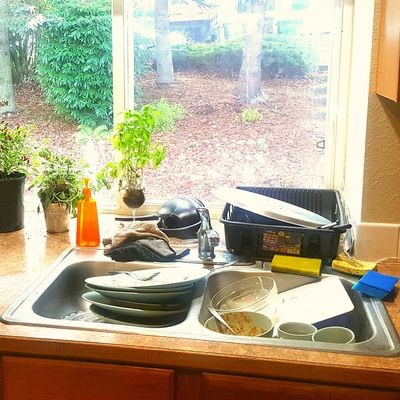
“This is like every single high-school bro,” I said to my husband one evening when we were talking about Kavanaugh’s yearbook. We were in the kitchen, which is where most of our conversations happen; We have a 1-year-old and an almost-4-year-old — two girls — and much of our waking life at home involves finding and preparing things for them to eat, washing bottles, picking up pieces of food from the floor so the ants don’t swarm. Our conversations are haphazard, taking place in fits and starts around the sound of a coffee grinder or the shriek of a baby who wants more cheese. “My friends and I did stupid stuff,” he pointed out, “but we would not have bragged about doing it with a girl in our yearbook.” This made me feel obscurely ashamed; I gathered soggy peach skin and oatmeal from the sink and didn’t say aloud that one of the reasons I married him is because he seemed like a fundamentally decent man, and how this seemed to set him apart from a lot of other men.
We were in the kitchen again the Thursday morning that Christine Blasey Ford gave her opening statement. The baby was eating her breakfast and the older one was milling around and telling us about a dream she’d had. Her dad and I moved closer and closer to the radio, turning the volume up and up, until we were standing shoulder to shoulder over the counter. Blasey Ford’s measured but slightly wavering voice wove in and out of my firstborn’s uncanny faux-adult cadence as the latter narrated something about flying through the air.
Shortly thereafter she went on to preschool and I went on to have, like many women, a shitty day. I listened to Brett Kavanaugh yelling while I drove to pick up a friend from the airport. I listened to various old men snuffling into the mic and to a tedious roll call of bros who were at lifting camp or football workout or whatever the fuck it was, Judge and Tom and Bernie and somebody named “Squee.” I thought about my own high school and wished I could pause the day I was having to drink 20 beers, as many beers as Kavanaugh drank, as many beers as possible to forget that Orrin Hatch exists and continues to have a say in my daughters’ future and mine.
When I picked up my big girl from preschool and got her home for the evening her behavior swiftly devolved into the kind of intense meltdown I thought we had left behind in the 2’s and early 3’s. Her dad came home and found me sullen on the couch, staring dead-eyed at her as she wailed on the floor next to the baby, whom she had just steamrolled. “I’ve never seen her like this,” he said, worried. “Yes you have,” I said, wanting, suddenly, to protect her from any implication of outré behavior, of hysteria. I realized then how stupid I had been to imagine that the atmosphere of the day, of the kitchen, of me, wouldn’t get to her, as if children don’t perceive the currents around them with the sensitivity of seismographs or hunting dogs. Finally I picked her up and got her to let me hold her, her legs and arms wrapped around me. “What’s wrong,” I asked her. “Everything” she sobbed. I wish she didn’t know.
Lydia Kiesling is the author of The Golden State, out now from Farrar, Straus, and Giroux’s MCD imprint.

